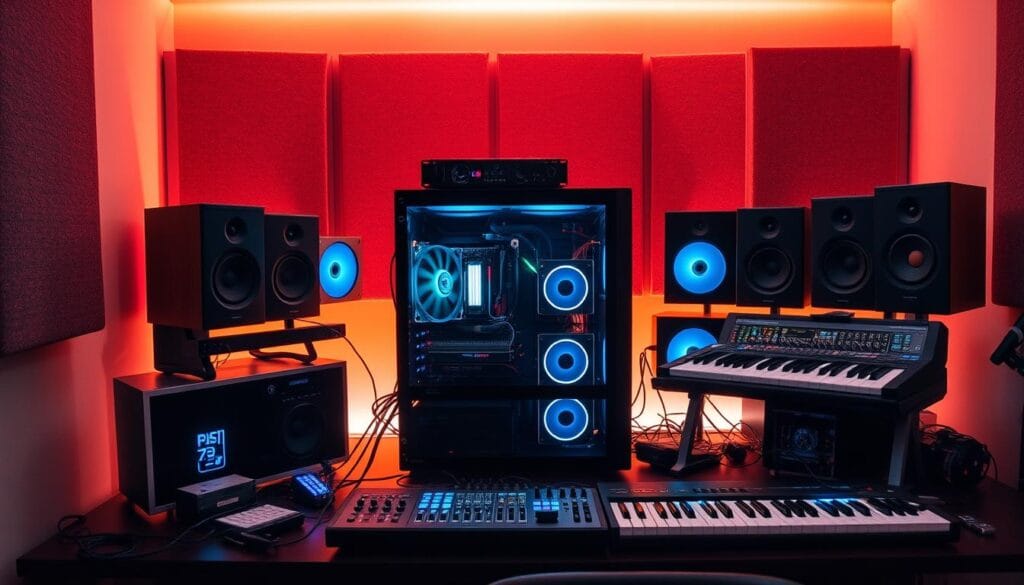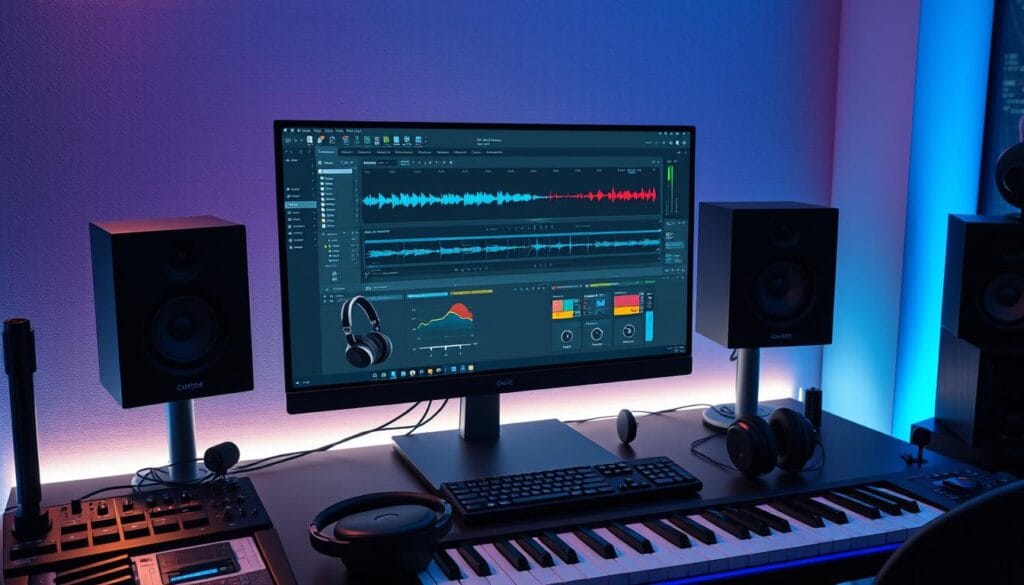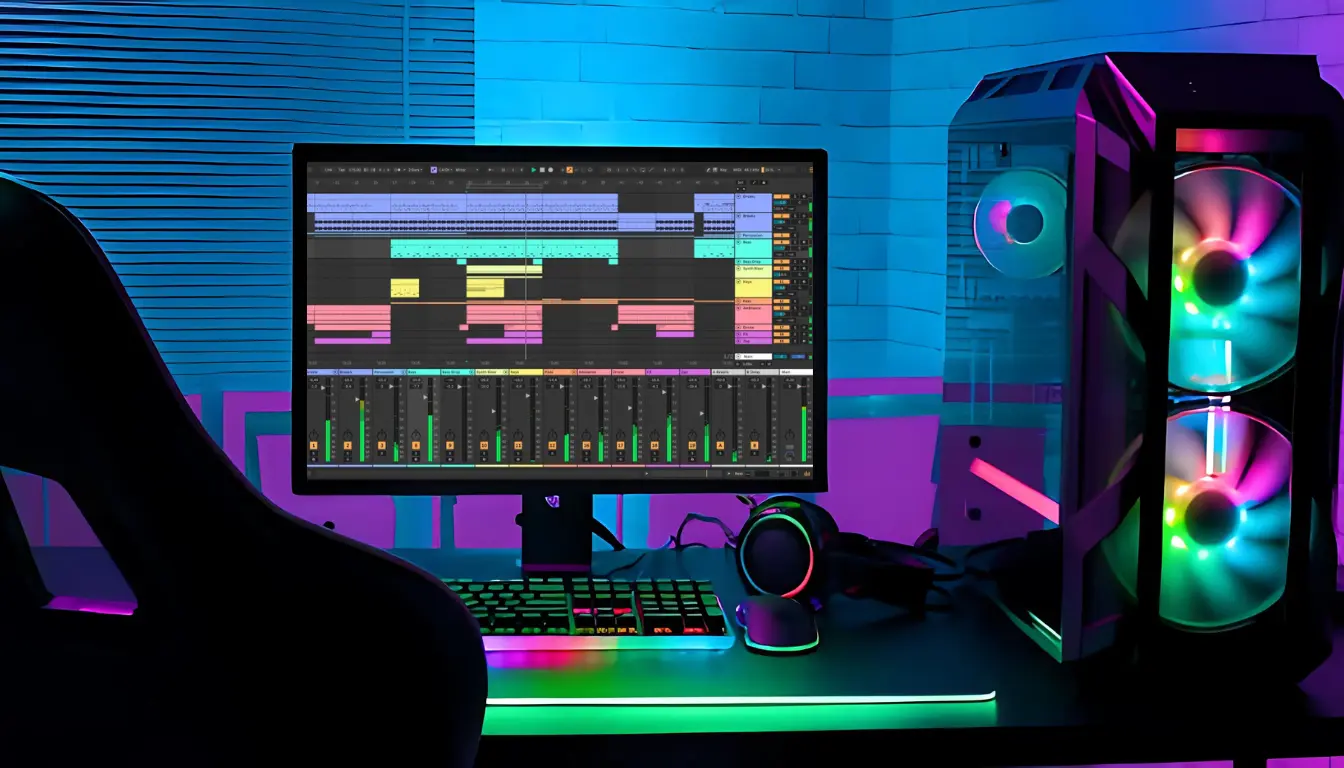The thrill of creating music starts with your gear. I’ve been there, stuck with a slow computer. That’s why I built the perfect audio workstation PC. Now, I’m sharing my knowledge with you.
Building your own music production computer is more than just parts. It’s about creating a space for your creativity. Whether you’re in your bedroom or a professional studio, the right computer matters. Let’s explore processors, RAM, and SSDs for your ultimate audio powerhouse.
Building a PC for music production is like composing a symphony. Each part is crucial. You need a CPU to keep things running smoothly, RAM for complex tasks, and storage for all your music. With the right setup, you’ll be ready to create amazing music.
Table of Contents
Understanding PC Requirements for Music Production
Creating a recording studio PC requires careful thought about key parts. Your music production desktop must handle complex audio tasks well. Let’s look at the main parts of a strong music editing PC.
Core Components Overview
The CPU is the heart of your music production setup. Look for a processor with many cores and high speeds. Here are some key specs:
- CPU: 2.2GHz i5 or i7 quad-core processor (minimum)
- RAM: 16GB (recommended), 32GB or more for professional use
- Storage: 500GB – 1TB SSD
Minimum vs Recommended Specifications
Starting with 8GB of RAM is okay, but 16GB is better for smooth music production. SSDs are faster than HDDs, making your PC run better. A 500GB SSD is the minimum, but 1TB gives you more room for your projects and samples.
Future-Proofing Considerations
Think about the future when building your music editing PC. Pick parts that will meet your needs now and later. A desktop is better for upgrading and saving money compared to laptops. Remember, your recording studio PC is an investment in your music, so find a balance between cost and performance.
“A well-built music production desktop is like a finely tuned instrument – it harmonizes power, efficiency, and expandability to create your best work.”
Choosing the Right CPU for Your Music Production PC
Choosing the right processor is key for a music production PC. It must handle complex audio tasks well. The right CPU can greatly improve your music production experience.
Intel vs AMD Processors
Intel and AMD both have great options for music production. The Intel Core i7-14700 and AMD Ryzen 7 7800X3D are top picks. For more power, look at the Intel Core i9 or AMD Ryzen 9 series.
Clock Speed and Core Count Importance
When picking a CPU, look for high clock speeds and many cores. These are crucial for efficient audio processing.
| CPU Feature | Importance | Recommended Specs |
|---|---|---|
| Clock Speed | High | 3.5 GHz or higher |
| Core Count | High | 6 cores or more |
| Thread Count | Medium | 12 threads or more |
Best CPU Models for Audio Processing
For a reliable music production PC, consider these CPUs:
Mac users can use Apple’s M series processors for great music production performance. A good processor ensures your DAW and plugins run smoothly.
Need help picking the perfect CPU for your music setup? Call PCAudioLabs at 615-933-6775 for expert advice on your ideal beat making PC.
Memory and Storage Solutions for Audio Production
Building a home recording PC needs careful thought about memory and storage. These parts are key to your audio setup’s performance and how well it works with your audio interface.
RAM Requirements and Speed Considerations
For smooth music making, get at least 16GB of RAM. If you can, go for 32GB or more. RAM speed matters too. Faster RAM helps when using many virtual instruments and effects at once.
SSD vs HDD for Music Production
SSDs are best for music making because they’re fast and quiet. They beat traditional HDDs in speed and noise. External SSDs can read and write data up to 2,100/2,000MB/s, which is much faster than HDDs.
Optimal Storage Configuration
A good storage setup for your home recording PC includes:
- A fast SSD for your operating system and DAW
- A separate SSD for projects, samples, and software
- An HDD for archiving finished projects
This setup is both fast and cost-effective. Look at the Crucial X10 Pro. It has up to 4TB capacity and is water, dust, and sand resistant. This keeps your music files safe.
| Storage Type | Pros | Cons |
|---|---|---|
| SSD | Fast, quiet, durable | More expensive per GB |
| HDD | Cheaper, large capacity | Slower, noisier |
| Hybrid (SSD + HDD) | Balance of speed and capacity | Requires management of files |
How to Build a Good PC for Music Production
Building a music production computer needs careful thought about key parts. Focus on processing power, RAM, and storage. These are key for smooth music software and handling big audio files.

For the best performance, pick a quad-core processor with a speed of at least 2.4 GHz. RAM is your computer’s memory, so aim for 16GB or more. This helps with quick data access and multitasking with many tracks and plugins.
Storage is also very important. Choose a fast SSD with at least 500GB. If you can, get a 1TB SSD for more room for virtual instruments and samples. Some people use a smaller SSD for the OS and often-used files and a bigger HDD for less-used data.
- Budget build: Around $506, with CPU at $112, SSD at $101, and motherboard at $90
- Mid-range build: About $1,281, featuring an Intel Core i7-14700K ($399) and MSI PRO Z790-A MAX WIFI motherboard ($240)
- High-end build: Approximately $1,714, with an Intel Core i9-14900K 24-Core Processor ($548) and 64GB RAM ($210)
When putting together your music production PC, make sure components work well together. Especially the CPU and motherboard. Also, think about your audio interface needs, like USB or Thunderbolt ports. With the right planning and parts, you’ll have a powerful music production computer that meets your needs.
Buy the Intel Core i7-14700K: Click here
Buy the Intel Core i9-14900K: Click here
Buy the MSI PRO Z790-A MAX WIFI motherboard: Click here
Motherboard Selection and Audio Interface Compatibility
Choosing the right PC motherboard for music production is key. It must work well with your components and offer the right features for audio production.
Form Factors and Features
Motherboards vary in size, with ATX being the most common. For smaller builds, Micro-ATX or Mini-ITX are good options. Look for motherboards with many RAM slots, PCIe slots, and USB ports for audio interfaces and peripherals.
Audio-Specific Considerations
Focus on high-quality onboard audio and low-latency performance when choosing a motherboard. The GIGABYTE Z590 AORUS has High-Grade 125dB SNR AMP-UP Audio. This ensures top-notch sound quality for your music.
Connectivity Options
It’s important to consider audio interface compatibility. Motherboards with many connectivity options are best. The Asus ProArt Z790-CREATOR WIFI has lots of options, making it great for different audio interfaces.
| Motherboard | Key Features | Price |
|---|---|---|
| Asus ROG Strix Z790-A Gaming Wi-Fi II | Intel LGA 1700, High-end | $338.99 |
| Gigabyte Z790 Aorus Elite AX | Intel LGA 1700, High-end | $225.50 |
| ASRock B650E Taichi Lite | AMD AM5, Midrange | $279.99 |
| MSI MAG B760 Tomahawk Wi-Fi | Intel LGA 1700, Budget-friendly | $178.99 |
Buy the Asus ROG Strix Z790-A Gaming Wi-Fi II: Click here
Buy the Gigabyte Z790 Aorus Elite AX: Click here
Buy the ASRock B650E Taichi Lite: Click here
Buy the MSI MAG B760 Tomahawk Wi-Fi: Click here
Find a motherboard that meets your needs and fits your budget. Think about your current and future needs when making your choice.
“The motherboard is the backbone of your music production PC, connecting all components and ensuring smooth operation.”
Power Supply and Cooling Requirements
Choosing the right power supply and cooling system is key for your music production desktop. A good power supply unit (PSU) keeps your system stable. Meanwhile, effective cooling ensures your recording studio PC runs smoothly.
When picking a PSU, choose one with enough wattage for all your components. Look for 80+ rated PSUs for better efficiency. Modular PSUs are also good for cable management, making your setup cleaner and improving airflow.
For cooling, you can go with air coolers or liquid coolers. Air coolers are budget-friendly and simple to install, fitting most music production setups. Liquid coolers, on the other hand, offer better performance but are pricier.
| Cooling Type | Pros | Cons |
|---|---|---|
| Air Cooler | Affordable, Easy to install | Less effective for high-end systems |
| Liquid Cooler | Superior performance | More expensive, Requires maintenance |
Make sure your case has good airflow to keep temperatures in check. This is crucial for recording studio PCs. Overheating can cause performance issues and unwanted noise during recording.
Remember, a well-cooled system is a quiet system, which is essential for a peaceful recording environment.
By carefully considering your power and cooling needs, you’ll build a stable and efficient music production desktop. It will meet your creative demands.
Case Selection and Noise Reduction Strategies
Choosing the right case for your home recording pc is key for top performance and quietness. A good case can greatly boost your music editing pc experience. It does this by cutting down on unwanted sounds and improving airflow.
Acoustic Treatment Options
To cut down on noise, look for cases with sound-dampening materials. Some top-notch cases come with foam or rubber inserts. These absorb vibrations and lower noise levels. You can also add aftermarket acoustic foam to better sound isolation.
Airflow Optimization
Good airflow is vital for keeping your music editing pc cool and quiet. Pick a case with smartly placed vents and many fan mounts. Using bigger, slower fans is a good idea. They move more air but make less noise.
Cable Management Solutions
Good cable management boosts looks and airflow. Look for cases with built-in cable routing options. Use zip ties or Velcro straps to keep cables tidy and organized.
| Feature | Benefit for Music Production |
|---|---|
| Sound-dampening materials | Reduces unwanted noise during recording |
| Multiple fan mounts | Allows for better cooling and lower fan speeds |
| Cable management options | Improves airflow and reduces clutter |
| Removable dust filters | Keeps components clean for optimal performance |
By picking a case with these features, you’ll make a perfect spot for your home recording pc. It will run quietly and perform at its best for your music production.
Operating System and Software Optimization
Choosing the right operating system for your daw computer is key. Both Windows and macOS are good for music production. Windows has more hardware options and customization. Macs are stable and work well with audio software.
For a beat making PC, Windows 11 is better with new processors. But, it might have more latency and jitter than Windows 10. If you have older audio interfaces, Windows 10 is safer because of better driver support.

It’s important to optimize your OS for audio production. Turn off background processes and adjust power settings for better performance. Also, tweak virtual memory and audio driver settings to reduce latency and improve stability.
- Set power plan to High Performance
- Disable Windows sounds
- Adjust virtual memory
- Update audio drivers regularly
Creating a dedicated partition for audio work can help keep your system clean. This keeps your system running at its best for music production.
| Component | Minimum Spec | Recommended Spec |
|---|---|---|
| Processor | Quad-core, 2.4GHz | Intel i5/i7 or AMD Ryzen |
| RAM | 8GB | 16GB or more |
| Storage | 500GB HDD | 1TB SSD |
| OS | 64-bit | Latest stable version |
Keep your software and drivers updated for the best performance. With these steps, your daw computer or beat making PC will be ready for any music production task.
Conclusion
Building a good PC for music production needs careful thought. A strong processor, like the Intel Core i9, is key. It handles complex tasks well. Also, have at least 64GB of RAM for smooth running of software and big projects.
Storage is also key. Choose fast SSDs with 1TB or more for quick access to audio files. Having multiple internal SSDs helps manage files better. Make sure your PC has enough USB and Thunderbolt ports for your audio and MIDI gear.
Building a custom PC gives you flexibility, but pre-built computers or cloud services are good alternatives. Remember, a music production computer needs strong computing power. Finding the right balance between cost and quality will give you a system that supports your creativity.
Buy the Intel Core i7-14700K: Click here
Buy the Intel Core i9-14900K: Click here
Buy the MSI PRO Z790-A MAX WIFI motherboard: Click here
Buy the Asus ROG Strix Z790-A Gaming Wi-Fi II: Click here
Buy the Gigabyte Z790 Aorus Elite AX: Click here
Buy the ASRock B650E Taichi Lite: Click here
Buy the MSI MAG B760 Tomahawk Wi-Fi: Click here
FAQ
What are the essential components for building a music production PC?
For a music production PC, you need a quad-core CPU with at least 2.4GHz speed. Also, 8GB+ RAM (16GB is better) and 500GB+ storage (SSD is best) are key. A motherboard with lots of USB ports and a 64-bit OS are also important. Don’t forget a cooling system and a good power supply. Graphics cards aren’t needed for audio editing.
How much RAM do I need for music production?
For the best music production, 16GB of RAM is recommended. But, 8GB is okay for beginners or small projects. The RAM’s speed, like DDR5, is as important as its amount.
What type of storage is best for a music production PC?
SSDs are better than HDDs for music production because they’re faster and quieter. You can use a mix of SSD (for OS and DAW) and HDD (for archiving) to save money. NVMe SSDs are even faster. Aim for at least 1TB of storage for your software and projects.
Which CPU is better for music production: Intel or AMD?
Both Intel and AMD have great CPUs for music production. Your choice depends on your needs and budget. The Intel Core i7-14700 and AMD Ryzen 7 7800X3D are good choices. For more, the Intel Core i9 or AMD Ryzen 9 series are better.
Do I need a dedicated graphics card for music production?
No, you don’t need a dedicated graphics card for music production. Modern CPUs have good integrated graphics for audio editing. Focus on spending on CPU, RAM, and storage for better audio performance.
What should I consider when choosing a motherboard for a music production PC?
When picking a motherboard, look at the form factor (ATX, Micro-ATX, or Mini-ITX) and CPU socket. Also, check for audio features, USB ports, PCIe slots, and expansion options. Make sure it works with your audio interface and other music gear.
How important is the power supply for a music production PC?
The power supply is very important for a stable music production PC. Choose a PSU with enough wattage for all your components. Go for 80+ rated PSUs for better efficiency. Modular PSUs are good for cable management, which helps with airflow and noise.
What cooling options should I consider for my music production PC?
You can choose between air coolers and liquid coolers for cooling. Air coolers are cheaper and easier to install, but liquid coolers perform better. Make sure your case has good airflow to keep temperatures down. Quiet fans and noise-reducing features in your case are also important.
Which operating system is better for music production: Windows or macOS?
The choice between Windows and macOS depends on your DAW and plugin needs. Both can handle high-performance music production. Make sure your OS is set up well for audio production to get the best performance.
How can I future-proof my music production PC?
To future-proof your PC, choose components that meet your current and future needs. Look at processor speed, RAM, and storage type. Pick a motherboard with expansion options and a power supply with room for upgrades. Keep your software and drivers up to date for the best performance.
